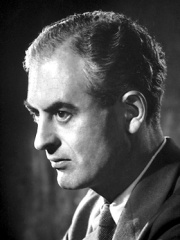
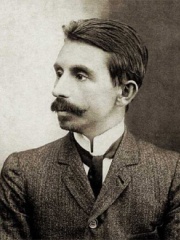
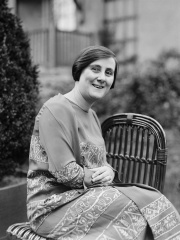
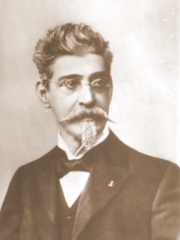
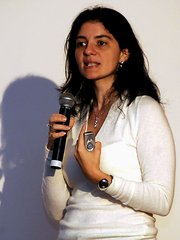
The Most Famous
BIOLOGISTS from Brazil
This page contains a list of the greatest Brazilian Biologists. The pantheon dataset contains 1,097 Biologists, 6 of which were born in Brazil. This makes Brazil the birth place of the 24th most number of Biologists behind Latvia, and Romania.
Top 6
The following people are considered by Pantheon to be the most legendary Brazilian Biologists of all time. This list of famous Brazilian Biologists is sorted by HPI (Historical Popularity Index), a metric that aggregates information on a biography's online popularity.

1. Peter Medawar (1915 - 1987)
With an HPI of 63.84, Peter Medawar is the most famous Brazilian Biologist. His biography has been translated into 56 different languages on wikipedia.
Sir Peter Brian Medawar (; 28 February 1915 – 2 October 1987) was a British biologist and writer, whose works on graft rejection and the discovery of acquired immune tolerance have been fundamental to the medical practice of tissue and organ transplants. For his scientific works, he is regarded as the "father of transplantation". He is remembered for his wit both in person and in popular writings. Richard Dawkins referred to him as "the wittiest of all scientific writers"; Stephen Jay Gould as "the cleverest man I have ever known". Medawar was the youngest child of a Lebanese father and a British mother, and was both a Brazilian and British citizen by birth. He studied at Marlborough College and Magdalen College, Oxford, and was professor of zoology at the University of Birmingham and University College London. Until he was partially disabled by a cerebral infarction, he was Director of the National Institute for Medical Research at Mill Hill. With his doctoral student Leslie Brent and postdoctoral fellow Rupert E. Billingham, he demonstrated the principle of acquired immunological tolerance (the phenomenon of unresponsiveness of the immune system to certain molecules), which was theoretically predicted by Sir Frank Macfarlane Burnet. This became the foundation of tissue and organ transplantation. He and Burnet shared the 1960 Nobel Prize in Physiology or Medicine "for discovery of acquired immunological tolerance".

2. Euclides da Cunha (1866 - 1909)
With an HPI of 58.69, Euclides da Cunha is the 2nd most famous Brazilian Biologist. His biography has been translated into 23 different languages.
Euclides da Cunha (Portuguese: [ewˈklidʒiʒ dɐ ˈkũɲɐ], January 20, 1866 – August 15, 1909) was a Brazilian journalist, sociologist and engineer. His most important work is Os Sertões (Rebellion in the Backlands), a non-fictional account of the military expeditions promoted by the Brazilian government against the rebellious village of Canudos, known as the War of Canudos. This book was a favorite of Robert Lowell, who ranked it above Tolstoy. Jorge Luis Borges also commented on it in his short story "Three Versions of Judas". The book was translated into English by Samuel Putnam and published by the University of Chicago Press in 1944. It remains in print. He was heavily influenced by Naturalism and its Darwinian proponents. Os Sertões characterised the coast of Brazil as a chain of civilisations while the interior remained more primitive. He occupied the 7th chair of the Brazilian Academy of Letters from 1903 until his death in 1909. He served as inspiration for the character of The Journalist in Mario Vargas Llosa's The War of the End of the World.

3. Bertha Lutz (1894 - 1976)
With an HPI of 57.10, Bertha Lutz is the 3rd most famous Brazilian Biologist. Her biography has been translated into 26 different languages.
Bertha Maria Júlia Lutz (2 August 1894 – 16 September 1976) was a Brazilian zoologist, politician, and diplomat. Lutz became a leading figure in both the Pan American feminist movement and human rights movement. She was instrumental in gaining women's suffrage in Brazil and represented her country at the United Nations Conference on International Organization, signing her name to the United Nations Charter and championing the inclusion of Article 8 in the Charter. In addition to her political work, she was a naturalist at the National Museum of Brazil, specializing in poison dart frogs. She has four frog species and two lizard species named after her.

4. João Barbosa Rodrigues (1842 - 1909)
With an HPI of 56.49, João Barbosa Rodrigues is the 4th most famous Brazilian Biologist. His biography has been translated into 15 different languages.
João Barbosa Rodrigues (June 22, 1842 – March 6, 1909) was considered one of Brazil's greatest botanists, known especially for his work on orchids and palms. For nearly two decades he was director of the Botanic Garden of Rio de Janeiro. Something of a polymath, he was a prolific botanical artist who also made contributions to his country's ethnography, geography, linguistics, zoology, and literature. The standard author abbreviation Barb.Rodr. is used to indicate this person as the author when citing a botanical name.

5. Warwick Estevam Kerr (1922 - 2018)
With an HPI of 56.17, Warwick Estevam Kerr is the 5th most famous Brazilian Biologist. His biography has been translated into 19 different languages.
Warwick Estevam Kerr (9 September 1922 – 15 September 2018) was a Brazilian agricultural engineer, geneticist, entomologist, professor and scientific leader, notable for his discoveries in the genetics and sex determination of bees. The Africanized bee in the western hemisphere is directly descended from 26 Tanzanian queen bees (Apis mellifera scutellata) accidentally released by one of his assistant bee-keepers. When reassembling a hive, the assistant forgot to install the queen excluder. This occurred in 1957 in Rio Claro, São Paulo in the southeast of Brazil from hives operated by Kerr, who had interbred honey bees from Europe and southern Africa.

6. Suzana Herculano-Houzel (b. 0)
With an HPI of 42.95, Suzana Herculano-Houzel is the 6th most famous Brazilian Biologist. Her biography has been translated into 14 different languages.
Suzana Herculano-Houzel (born 1972) is a Brazilian neuroscientist. Her main field of work is comparative neuroanatomy; her findings include a method of counting neurons in human and other animals' brains and the relation between the cerebral cortex area and the thickness and number of cortical folds.
People
Pantheon has 6 people classified as Brazilian biologists born between 1842 and 1922. Of these 6, 1 (16.67%) of them are still alive today. The most famous living Brazilian biologists include Suzana Herculano-Houzel. The most famous deceased Brazilian biologists include Peter Medawar, Euclides da Cunha, and Bertha Lutz. As of April 2024, 1 new Brazilian biologists have been added to Pantheon including Suzana Herculano-Houzel.
Living Brazilian Biologists
Go to all RankingsDeceased Brazilian Biologists
Go to all RankingsPeter Medawar
1915 - 1987
HPI: 63.84
Euclides da Cunha
1866 - 1909
HPI: 58.69
Bertha Lutz
1894 - 1976
HPI: 57.10
João Barbosa Rodrigues
1842 - 1909
HPI: 56.49
Warwick Estevam Kerr
1922 - 2018
HPI: 56.17
Newly Added Brazilian Biologists (2025)
Go to all RankingsOverlapping Lives
Which Biologists were alive at the same time? This visualization shows the lifespans of the 5 most globally memorable Biologists since 1700.

